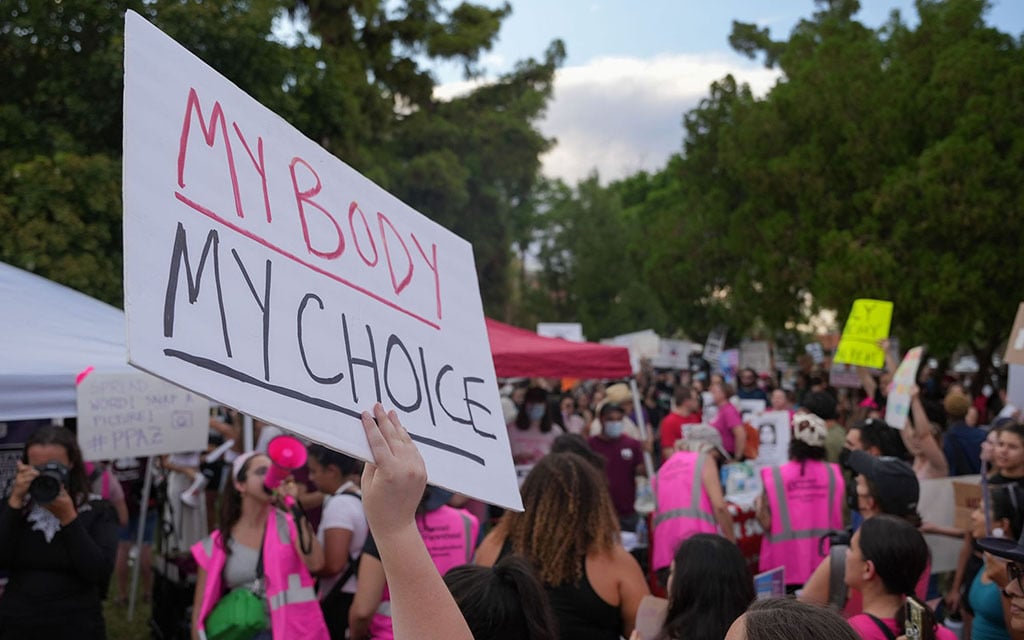
Abortion-rights activists rally outside the Arizona Capitol in June 2022 to protest the U.S. Supreme Court’s ruling in Dobbs, which overturned Roe v. Wade. The Arizona Supreme Court’s enactment of an 1864 law and its subsequent repeal has brought abortion and related issues like contraception to a new level of salience in Arizona. (File photo by Troy Hill/Cronkite News)
WASHINGTON – Senate Republicans blocked a measure that would ensure access to birth control nationwide as reproductive rights dominate the upcoming Arizona elections.
The 51-39 vote fell short of the 60 needed to proceed. Democrats had expected the effort to fail but were eager to score political points.
Sen. Kyrsten Sinema, I-Ariz., and Sen. Mark Kelly, D-Ariz., both voted for the Right to Contraception Act. The leading contenders for the seat Sinema is vacating, U.S. Rep. Ruben Gallego, D-Phoenix, and Republican Kari Lake, have tussled over reproductive rights – abortion rights in particular.
“I don’t want to see a situation where women lose more rights,” Kelly told Cronkite News ahead of the vote.
The clash comes nearly two years after the U.S. Supreme Court overturned Roe v. Wade, ending a half-century of constitutional protection for abortion rights. Restrictions have grown in Arizona and other states, along with concerns regarding bodily autonomy.
Democrats argued that Wednesday’s bill is needed to end uncertainty. Republicans called it nothing but a messaging exercise because there is no serious push to ban distribution or use of contraceptives, in Congress or in any statehouse.
Even if the bill passed in the Senate, it would have no chance in the Republican-majority House. But Democrats see the issue as a key to success in the November elections and are keen to preserve it in the public consciousness.
Following the Senate vote, the Biden-Harris campaign announced a press conference in Tucson on Thursday to mobilize voters around the issue of contraception access in Arizona.
Reproductive rights “will be one of the most important issues in the November election. It will be an important fight in all of the swing states,” North Carolina Gov. Roy Cooper said Wednesday on a media call organized by the Biden campaign.
In March, Democratic bills aiming to codify access to contraception failed in the Arizona Legislature, which Republicans control. Republicans also have quashed efforts to guarantee access to birth control in Louisiana and Virginia and at least a dozen other states since the fall of Roe.
In April the Arizona Supreme Court ruled that a near-total ban on abortion enacted in 1864, almost a half-century before statehood, remained in force and could be enforced starting Sept. 26.
The ruling sent shockwaves through the state and led to mass protests. The GOP-controlled Legislature quickly repealed the 1864 ban and Gov. Katie Hobbs, a Democrat, eagerly signed the repeal.
That restored the right to abortion in Arizona for the first 15 weeks of pregnancy – though there may be a few days when the 1864 ban is in effect unless the Legislature adjourns by June 28. That’s 90 days before Sept. 26, which is how long it takes for the repeal to take effect.
Lake, who’d previously called abortion “the ultimate sin,” called the ruling allowing the 1864 near-total ban “out of step with Arizonans.”
Lake and “other Republicans in Arizona have really struggled to figure out how to deal with this,” said Samara Klar, a political science professor at the University of Arizona. “Many Republicans across the country are really trying to distance themselves from the abortion ban and kind of trying to figure out how they can support public opinion without totally backtracking.”
Two Republicans sided with Democrats on Wednesday’s birth control vote, Sens. Lisa Murkowski of Alaska and Susan Collins of Maine.
Last year, Hobbs issued an executive order allowing women over 18 to access over-the-counter contraception without a prescription. In May, she ordered free over-the-counter birth control for state employees.
The U.S. Supreme Court established a fundamental right to contraception nearly six decades ago in Griswold v. Connecticut. The 7-2 ruling in 1965 struck down a state-level ban on contraception for married couples, a landmark in privacy law. The high court expanded the right to unmarried men and women in 1972.
Rulings on abortion rights relied partly on the same sorts of privacy arguments. Conservative Justice Clarence Thomas, in a separate opinion when the court struck down Roe, called on the court to reassess rulings on same-sex marriage and birth control, too.
“That right established by the court really has never been more vulnerable than it is now. We’re seeing right-wingers across the country attacking contraception in state legislatures,” said Cooper, the North Carolina governor.
Views on birth control are largely consistent regardless of party. A Gallup survey last year showed that 88% of Americans view birth control as morally acceptable. Polling from FiveThirtyEight in 2022 showed 70% of voters believe emergency contraception pills such as Plan B should be legal.
Former President Donald Trump quickly backtracked last month after telling a Pittsburgh TV station that he “was looking at” contraception restrictions. Within hours, he posted on Truth Social, “I DO NOT SUPPORT A BAN ON BIRTH CONTROL,” reflecting the potency of the issue.
The tussle over the Senate bill could play to Democrats’ advantage in Arizona, said Klar, the UArizona political scientist.
“The abortion issue is humongous in Arizona right now,” Klar said. “The Supreme Court ruling, which really brought it back into the national spotlight and, now, the ballot measure in November that addresses the right to abortion in Arizona.”
Democrats benefit from “anything that can keep this in the news and keep people feeling like they need … to get involved in order to protect reproductive rights,” she said.

